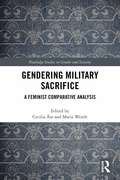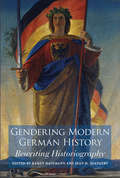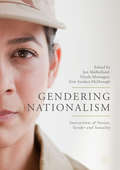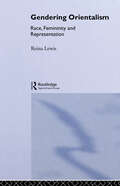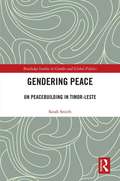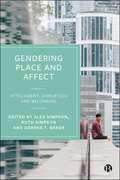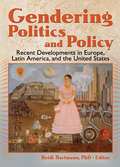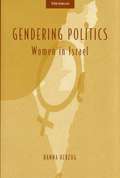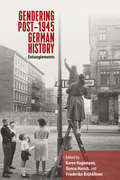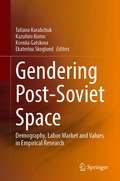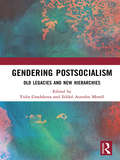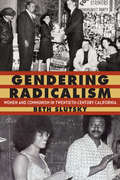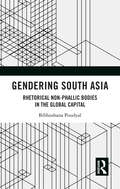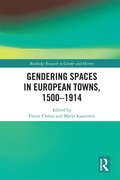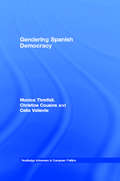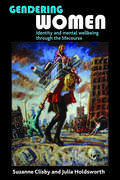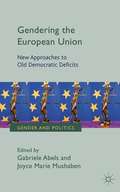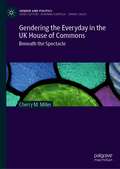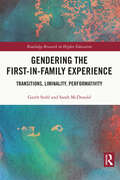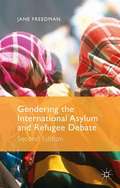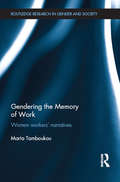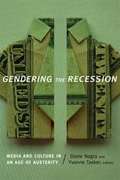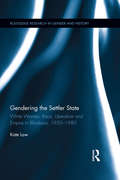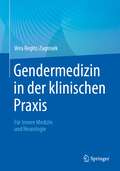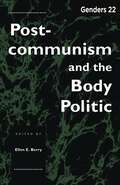- Table View
- List View
Gendering Military Sacrifice: A Feminist Comparative Analysis (Routledge Studies in Gender and Security)
by Cecilia Åse Maria WendtThis book offers a feminist analysis of military sacrifice and reveals the importance of a gender perspective in understanding the idea of honourable death. In present-day security discourses, traditional masculinised obligations to die for the homeland and its women and children are challenged and renegotiated. Working from a critical feminist perspective, this book examines the political and societal justifications for sacrifice in wars motivated by human rights and an international responsibility to protect. With original empirical research from six European countries, the volume demonstrates how gendered and nationalistic representations saturate contemporary notions of sacrifice and legitimate military violence. A key argument is that a gender perspective is necessary in order to understand, and to oppose, the idea of the honourable military death. Bringing together a wide range of materials – including public debates, rituals, monuments and artwork – to analyse the justifications for soldiers’ deaths in the Afghanistan war (2002–14), the analysis challenges methodological nationalism. The authors develop a feminist comparative methodology and engage in cross-country and transdisciplinary analysis. This innovative approach generates new understandings of the ways in which both the idealisation and the political contestation of military violence depend on gendered national narratives. This book will be of much interest to students of gender studies, critical military studies, security studies and International Relations.
Gendering Modern German History
by Jean H. Quataert Karen HagemannWriting on the history of German women has - like women's history elsewhere - undergone remarkable expansion and change since it began in the late 1960s. Today Women's history still continues to flourish alongside gender history but the focus of research has increasingly shifted from women to gender. This shift has made it possible to make men and masculinity objects of historical research too. After more than thirty years of research, it is time for a critical stocktaking of the "gendering" of the historiography on nineteenth and twentieth century Germany. To provide a critical overview in a comparative German-American perspective is the main aim of this volume, which brings together leading experts from both sides of the Atlantic. They discuss in their essays the state of historiography and reflect on problems of theory and methodology. Through compelling case studies, focusing on the nation and nationalism, military and war, colonialism, politics and protest, class and citizenship, religion, Jewish and non-Jewish Germans, the Holocaust, the body and sexuality and the family, this volume demonstrates the extraordinary power of the gender perspective to challenge existing interpretations and rewrite mainstream arguments.
Gendering Nationalism: Intersections Of Nation, Gender And Sexuality
by Nicola Montagna Jon Mulholland Erin Sanders-McDonaghThis volume offers an empirically rich, theoretically informed study of the shifting intersections of nation/alism, gender and sexuality. Challenging a scholarly legacy that has overly focused on the masculinist character of nationalism, it pays particular attention to the people and issues less commonly considered in the context of nationalist projects, namely women and sexual minorities. Bringing together both established and emerging researchers from across the globe, this multidisciplinary and comparison-rich volume provides a multi-sited exploration of the shifting contours of belonging and Otherness generated by multifarious nationalisms. The diverse, and context specific positionings of men and women, masculinities and femininities, and hegemonic and non-normative sexualities, vis-à-vis nation/alism, are illuminated through a vibrant array of contemporary theoretical lenses. These include historical and feminist institutionalism, post-colonial theory, critical race approaches, transnational and migration theory and semiotics.
Gendering Orientalism: Race, Femininity and Representation (Gender, Racism, Ethnicity Ser.)
by Reina LewisIn contrast to most cultural histories of imperialism, which analyse Orientalist images of rather than by women, Gendering Orientalism focuses on the contributions of women themselves. Drawing on the little-known work of Henriette Browne, other `lost' women Orientlist artists and the literary works of George Eliot, Reina Lewis challenges masculinist assumptions relating to the stability and homogeneity of the Orientalist gaze.Gendering Orientalism argues that women did not have a straightforward access to an implicitly nale position of western superiority, Their relationship to the shifting terms of race, nation and gender produced positions from which women writers and artists could articulate alternative representations of racial difference. It is this different, and often less degrading, gaze on the Orientalized `Other' that is analysed in this book. By revealing the extent of women's involvement in the popular field of visual Orientalism and highlighting the presence of Orientalist themes in the work of Browne, Eliot and Charlotte Bronte, reina Lewis uncovers women's roles in imperial culture and discourse. Gendering Orientalism will appeal to students, lecturers and researchers in cultural studies, literature, art history, women's studies and anthropology.
Gendering Peace: UN Peacebuilding in Timor-Leste (Routledge Studies in Gender and Global Politics)
by Sarah SmithIn 1999, after 24-years of violent military occupation by Indonesian forces, the small country of Timor-Leste became host to one of the largest UN peace operations. The operation rested on a liberal paradigm of statehood, including nascent ideas on gender in peacebuilding processes. This book provides a critical feminist examination of the form and function of a gendered peace in Timor-Leste. Drawing on policy documents and field research in Timor-Leste with national organisations, international agencies and UN staff, the book examines gender policy with a feminist lens, exploring and developing a more complex account of ‘gender’ and ‘women’ in peace operations. It argues that gendered ideologies and power delimit the possibilities of building a gender-just peace, and contributes deep insight into how gendered logics inform peacebuilding processes, and specifically how these play out through the implementation of policy that explicitly seeks to reorder gender relations at sites in which peace operations deploy. By utilising a single case study, the book provides space to examine both international and national discourses, and contextualises its analysis of Women, Peace and Security within local histories and contexts. This book will be of interested to scholars and students of gender studies, global governance, International Relations, and security studies.
Gendering Place and Affect: Attachment, Disruption and Belonging
by Nick Rumens Rachel Morgan Katherine Johnson Melissa Tyler Patricia Lewis Christina Schwabenland Murray Lee Anna Hickey-Moody Nicholas Hill Daniel Harris Evgenniia Kuziner Nyk Robertson Troy Innocent Jessica Horne Paul McGuinness Alison Hirst Corina Sheerin Rajeshwari Chennangodu George KandathilDrawing on affect theory and the key themes of attachment, disruption and belonging, this book examines the ways in which our placed surroundings – whether urban design, border management or organisations – shape and form experiences of gender.Bringing together key debates across the fields of sociology, geography and organisation studies, the book sets out new theoretical ground to examine and consolidate shared experiences of what it means to be in or out of place.Contributors explore how our gendered selves encounter place, and critically examine the way in which experiences of gender shape meanings and attachments, as well as how place produces gendered modes of identity, inclusion and belonging. Emphasizing the intertwined dynamics of affect and being affected, the book examines the gendering of place and the placing of gender.
Gendering Politics and Policy: Recent Developments in Europe, Latin America, and the United States
by Heidi I. HartmannTop feminist theorists and scholars examine the latest developments in gender politics and policy around the worldGendering Politics and Policy: Recent Developments in Europe, Latin America, and the United States discusses in depth how women and women&’s perspectives are changing politics and policy in both the United States and around the world. This compelling resource surveys a range of issues and methodologies to bring the most recent gender issues, politics, and policies into clear focus. Top feminist scholars and theorists from several disciplines explore the latest in gender mainstreaming, gender budgeting, citizenship, social capital, and the gender gap in various cultures and countries.Gendering Politics and Policy provides case studies of different policy areas, techniques, and political practice as it highlights issues important for women and women&’s issues around the world. The book&’s three main sections include detailed looks at politics and gender issues in the United States, policies of concern for women in Latin America and Europe, and women&’s agendas in the United Nations. This book is extremely useful as a teaching tool for students by surveying a wide range of vital issues and methodologies of gender development, women and politics, women and public policy, and women in international politics. The text is extensively referenced and includes several tables and figures to clearly present data and ideas.Gendering Politics and Policy discusses: the need for women&’s citizenship-a new form of gendered citizenship more inclusive of women&’s issues that strengthens democratic governability gender politics in presidential elections-including the impact the attention to women&’s votes has had on public policies of administrations between elections the relationships between women&’s status and social capital attack campaigning of male candidates against women candidates the gender implications of economic policy in the United Kingdom the discretionary nature of funding for support of domestic violence laws in Latin America, Central America, and the Caribbean region women&’s increased leadership roles in German government the need for gender mainstreaming in the German economy child care as an international human right the involvement of women&’s nongovernmental organizations at UN conferencesGendering Politics and Policy is illuminating reading for educators, advanced undergraduate and graduate students in women&’s studies, political science, and public policy, as well as policy researchers and women leaders around the world.
Gendering Politics: Women in Israel
by Hanna HerzogWhat are the cultural and structural mechanisms that exclude women from politics in general and from local politics in particular? What meaning is ascribed to women's political activity? Gendering Politics explores the place of women in democratic politics by means of a detailed study of women in Israeli politics who were elected to municipal councils from 1950 to 1989. Drawing from a variety of sources, including questionnaires, interviews, newspaper coverage, and existing statistical data, as well as examinations of studies of the role of women in politics in other democracies, Herzog analyzes the extent of success and failure of women in Israeli elections. She then explores reasons why female participation in Israeli politics has been relatively slight, despite historical precedents and social circumstances that would indicate otherwise. The author examines the gendered bias of the power structure as it is shaped by basic cultural organizing principles. She exposes hidden assumptions--and notes the overt assumptions--which by definition exclude women from politics. The author also looks at the structure of opportunities within the prevailing political system, uncovering the relevant blocking and facilitating elements.
Gendering Post-1945 German History: Entanglements
by Karen Hagemann Donna Harsch Friederike BrühöfenerAlthough “entanglement” has become a keyword in recent German history scholarship, entangled studies of the postwar era have largely limited their scope to politics and economics across the two Germanys while giving short shrift to social and cultural phenomena like gender. At the same time, historians of gender in Germany have tended to treat East and West Germany in isolation, with little attention paid to intersections and interrelationships between the two countries. This groundbreaking collection synthesizes the perspectives of entangled history and gender studies, bringing together established as well as upcoming scholars to investigate the ways in which East and West German gender relations were culturally, socially, and politically intertwined.
Gendering Post-Soviet Space: Demography, Labor Market and Values in Empirical Research
by Tatiana Karabchuk Kazuhiro Kumo Kseniia Gatskova Ekaterina SkoglundThis volume combines approaches from three disciplines – economics, sociology, and demography – and empirically analyzes the key aspects of the labor market and social demography processes in post-Soviet transitional societies while focusing on the gender perspective. Here, readers will find empirical studies on such countries as Armenia, Azerbaijan, Belarus, Estonia, Georgia, Kazakhstan, Kyrgyzstan, Russia, Tajikistan, Ukraine, and Uzbekistan. The volume contributes to the literature by addressing the lack of academic empirical research on gender difference issues in the labor markets of post-Soviet countries as well as gender inequalities in fertility preferences, gender disparities among the youth and elderly, the gender pay gap, gender differences in employment, and female voices. The book brings together researchers of different disciplines from a variety of countries, distinguishing this project as international and interdisciplinary. The authors use the quantitative survey micro-data approach as well as the qualitative methods of interview data analysis to provide a comprehensive and detailed overview of the economic and social developments in the region regarding gender differences. The volume consists of three parts tackling the following topics: 1) gender differences and demography (family formation and fertility, youth and elderly employment); 2) gender differences and labor market (gender wage gap, motherhood wage penalty, gender differences among freelancers, and women in STEM science); and 3) gender differences, well-being, and gender equality attitudes (women’s voices, women’s collective actions, gender equality attitudes, and spending patterns of housewives).
Gendering Postsocialism: Old Legacies and New Hierarchies (Global Gender)
by Yulia Gradskova Ildikó Asztalos MorellGendering Postsocialism explores changes in gendered norms and expectations in Eastern Europe and Eurasia after the fall of the Berlin Wall. The dismantlement of state socialism in these regions triggered monumental shifts in their economic landscape, the involvement of their welfare states in social citizenship and, crucially, their established gender norms and relations, all contributing to the formation of the postsocialist citizen. Case studies examine a wide range of issues across 15 countries of the post-Soviet era. These include gender aspects of the developments in education in Kazakhstan, Uzbekistan and Hungary, controversies around abortion legislation in Poland, migrant women and housing as a gendered problem in Russia, challenges facing women’s NGOs in Bosnia, and identity formation of unemployed men in Lithuania. This close analysis reveals how different variations of neoliberal ideology, centred around the notion of the self-reliant and self-determining individual, have strongly influenced postsocialist gender identities, whilst simultaneously showing significant trends for a “retraditionalising” of gender norms and expectations. This volume suggests that despite integration with global political and free market systems, the postsocialist gendered subject combines strategies from the past with those from contemporary ideologies to navigate new multifaceted injustices around gender in Eastern Europe and Eurasia.
Gendering Radicalism: Women and Communism in Twentieth-Century California (Women in the West)
by Beth SlutskyIn 1919 Charlotte Anita Whitney, a wealthy white woman, received one of the first Communist Labor Party membership cards for the charter group of the northern California Communist Labor Party. Less than a decade later in Berkeley, California, a Jewish woman named Dorothy Ray Healey became a card-carrying member of the Young Communist League. Nearly forty years later, in 1966, Kendra Claire Harris Alexander, a mixed-race woman, enlisted with the Los Angeles branch of the Communist Party, determined to promote class equality. In Gendering Radicalism, Beth Slutsky examines how American leftist radicalism was experienced through the lives of these three women who led the California branches of the Communist Party from its founding in 1919 to its near dissolution in 1992. Separately, each woman represents a generation of the membership and activism of the party. Collectively, Slutsky argues, their individual histories tell the story of one of the most infamous organizations this country has ever known and in a broader sense represent the story of all women who have devoted their lives to radicalism in America. Slutsky considers how gender politics, California’s political climate, coalitions with other activist groups and local communities, and generational dynamics created a grassroots Communist movement distinct from the Communist parties in the Soviet Union and Europe. An ambitious comparative study, Gendering Radicalism demonstrates the continuity and changes of the party both within and among three generations of its female leaders’ lives.
Gendering South Asia: Rhetorical Non-Phallic Bodies in the Global Capital
by Bibhushana PoudyalThis book looks at how gendered female bodies and non-phallic bodies function, are rhetoricized as functioning, are made to function, or are functioned upon in two extremized spaces—the private and the public. Using rape and menstruation as the marker of the invisible /private and the female body and non-phallic bodies on the street as the marker of the visible/public, it shows how these binaries often overlap in the global capital. The author discusses how the raped body constantly becomes visible in the media, the cycle of the bodily fluid is tabooed and consumerized in the market, and the street constantly marginalizes, victimizes, erases, hypersexualizes, and hyper-visibilizes the female body as valued/devalued capital, and homophobic-transphobic culture alienates the body which is non-heterosexual and non-heteronormative. An important contribution, this volume will be indispensable for students and teachers of gender and sexuality studies, public health, sociology, human rights, South Asian studies, medical sociology, and cultural studies.
Gendering Spaces in European Towns, 1500-1914 (Routledge Research in Gender and History #35)
by Elaine Chalus Marjo KaartinenTowns are imagined, lived and experienced, as much as they are conceived and constructed. They reflect cultural and intellectual currents, prevailing economic climates and unresolved tensions. They are physical entities, shaped by topography, time and technology, as well as social and spatial constructs. They are also always gendered and contested spaces. This volume, the last from the Gender in the European Town (GENETON) project, approaches life in the European town over time and across class and national boundaries. Through contextualized case studies, it provides scholars and students with new research—snapshots—of contemporary physical and built environments that explores how contemporary urban residents experienced and deployed gendered urban spaces over an important period of modernization.
Gendering Spanish Democracy (Routledge Advances in European Politics #Vol. 20)
by Monica Threlfall Christine Cousins Celia ValienteThis book provides an up-to-date critical assessment of gender in Spain with reference to the key social and political fields. It addresses aspects of women's experience such as the public spheres of elective politics, public policy-making and the labour market. This is underpinned by an in-depth analysis of underlying dynamics and structures that contribute to shaping gender relations in Spain, including women's activism, the family and the state social security system.
Gendering Women: Identity and Mental Wellbeing through the Lifecourse
by Suzanne Clisby Julia HoldsworthAvailable Open Access under CC-BY-NC-ND licence Gendering Women is an engaging and accessible account of how constructions of femininity fundamentally affect women's mental wellbeing through the life course. Led by women’s life history accounts of growing up and growing older in the north of England, this book shows how experiences of becoming and being a woman – in family life, education, employment, motherhood and situations of violence – both enable and erode self confidence and esteem. The challenges to women’s mental wellbeing cut across age and class differences and have profound impacts on the material conditions of women’s lives throughout the life course. This is in turn a driver of inequality that is often under-recognised in mainstream policy. Based on feminist and ethnographically informed research with over five hundred women Gendering women provides a critical link between gender theory and the lived realities of women’s daily lives and will appeal to students and academics in sociology and social sciences.
Gendering the European Union
by Gabriele Abels Joyce Marie MushabenAn exploration of European integration as seen through a gender lens. This book looks at integration theories, institutional relationships, enlargement, the development of gender law and the role of formal actors, scholars and expert networks in the EU policy-making process. With a focus on gender mainstreaming as a new approach to gender policy.
Gendering the Everyday in the UK House of Commons: Beneath the Spectacle (Gender and Politics)
by Cherry M. MillerThis book explores the reproduction of gender ‘beneath the spectacle’ – that is, beneath ceremonial displays of power, in the UK House of Commons. Contributing to a fascinating literature on gender and parliaments, the book conceives of the House of Commons as a workplace, as well as a representative arena. It explores the everyday consequences for gendered power relations that this unique environment entails, as parliamentary actors perform their careers, citizenship, and public service. The book firstly explores ways to conceive of and to study gender in parliaments. Parliamentary ethnography – that is, spending time observing and engaging with parliamentary actors, is presented as an unparalleled methodology to better understand gender, power, and agency. The chapters that follow provide in-depth portrayals of gender and the parliamentary workplace. The book connects multiple actors in the House of Commons: MPs, officials, parliamentary researchers, and the (in)formal rules that structure the relationships between them.
Gendering the First-in-Family Experience: Transitions, Liminality, Performativity (Routledge Research in Higher Education)
by Garth Stahl Sarah McDonaldDespite efforts to widen participation, first-in-family students, as an equity group, remain severely under-represented in higher education internationally. This book explores and analyses the gendered and classed subjectivities of 48 Australian students in the First-in-Family Project serving as a fresh perspective to the study of youth in transition. Drawing on liminality to provide theoretical insight, the authors focus on how they engage in multiple overlapping and mutually informing transitions into and from higher education, the family, service work, and so forth. While studies of class disadvantage and widening participation in HE remains robust, there is considerably less work addressing the gendered experiences of first-in-family students.
Gendering the International Asylum and Refugee Debate
by Jane FreedmanThis study provides a comprehensive account of the situation of women refugees globally and explains how they differ from men. It looks at causes of refugee flows, international laws and conventions and their application, the policies and legislation of Western governments, and lived experiences of the refugees themselves.
Gendering the Memory of Work: Women Workers’ Narratives (Routledge Research in Gender and Society)
by Maria TamboukouThis book explores gendered aspects in the memory of work by looking at auto/biographical narratives and political writings of women workers in the garment industry. The author draws on cutting edge theoretical approaches and insights in memory studies, neo-materialism and discourse analysis, particularly looking at entanglements and intra-actions between places, bodies and objects. Tamboukou aims to enrich our appreciation of the role of women’s labour history in the wider realm of cultural memory, as well as in the politics of women’s work. The book addresses a significant gap in the literature by focusing on the memory of work from a gendered perspective. It also examines the relationship between workspaces and personal spaces: the intimate, intense and often invisible ways through which workers occupy workspaces and populate them with their ideas, emotions, beliefs, habits and everyday practices. The book will be a theoretical and methodological toolbox for students and researchers in the interface of the social sciences and the humanities, as well as a vital resource in women’s labour history. It will be particularly relevant for sociologists, cultural theorists, feminist scholars and social historians.
Gendering the Recession: Media and Culture in an Age of Austerity
by Diane Negra Yvonne TaskerThis timely, necessary collection of essays provides feminist analyses of a recession-era media culture characterized by the reemergence and refashioning of familiar gender tropes, including crisis masculinity, coping women, and postfeminist self-renewal. Interpreting media forms as diverse as reality television, financial journalism, novels, lifestyle blogs, popular cinema, and advertising, the contributors reveal gendered narratives that recur across media forms too often considered in isolation from one another. They also show how, with a few notable exceptions, recession-era popular culture promotes affective normalcy and transformative individual enterprise under duress while avoiding meaningful critique of the privileged white male or the destructive aspects of Western capitalism. By acknowledging the contradictions between political rhetoric and popular culture, and between diverse screen fantasies and lived realities, Gendering the Recession helps to make sense of our postboom cultural moment.Contributors. Sarah Banet-Weiser, Hamilton Carroll, Hannah Hamad, Anikó Imre, Suzanne Leonard, Isabel Molina-Guzmán, Sinéad Molony, Elizabeth Nathanson, Diane Negra, Tim Snelson, Yvonne Tasker, Pamela Thoma
Gendering the Settler State: White Women, Race, Liberalism and Empire in Rhodesia, 1950-1980 (Routledge Research in Gender and History)
by Kate LawWhite women cut an ambivalent figure in the transnational history of the British Empire. They tend to be remembered as malicious harridans personifying the worst excesses of colonialism, as vacuous fusspots, whose lives were punctuated by a series of frivolous pastimes, or as casualties of patriarchy, constrained by male actions and gendered ideologies. This book, which places itself amongst other "new imperial histories", argues that the reality of the situation, is of course, much more intricate and complex. Focusing on post-war colonial Rhodesia, Gendering the Settler State provides a fine-grained analysis of the role(s) of white women in the colonial enterprise, arguing that they held ambiguous and inconsistent views on a variety of issues including liberalism, gender, race and colonialism.
Gendermedizin in der klinischen Praxis: Für Innere Medizin und Neurologie
by Vera Regitz-ZagrosekDas Buch ist ein praxisorientiertes Nachschlagewerk für alle Ärztinnen und Ärzte, die die komplizierten Zusammenhänge zwischen Geschlecht und Gesundheit verstehen wollen. Geschlechtsspezifische Konzepte werden für die Innere Medizin und die Neurologie praxisrelevant aufbereitet – als Information für Kliniker*innen in den internistischen Disziplinen und der Neurologie, daneben auch für Spezialist*innen, die sich mit Pharmakotherapie, Pathophysiologie und Genomik befassen. Die einzelnen Gebiete werden systematisch im Hinblick auf geschlechtsspezifische Unterschiede in Prävention, Klinik, Diagnose, interventioneller und pharmakologischer Therapie dargestellt.
Genders 22: Postcommunism and the Body Politic
by Ellen E. BerryThe epidemic of mass rape in the former Yugoslavia has illustrated once again, and in particularly brutal fashion, the inextricable relationship between national politics, sexual politics, and body politics. The nexus of these three forces is highly charged in any culture, at any time in history, but especially so among cultures in which rapid, even cataclysmic, changes in material realities and national self-conceptions are eroding or overwhelming previously secure boundaries.The postcommunist moment in the so-called Second World--Central and Eastern Europe and the former Soviet Union--has dramatically exposed the opportunities and dangers that arise when the political, cultural, and economic foundations of a society are de- and then re-structured. Gender roles and relations, expressions of sexuality or attempts to recontain them, representations of the body, especially the female body, and the larger, cultural meanings it assumes, are particularly marked sites to witness the performance of complex national dramas of crisis and change.This groundbreaking volume turns its attention to the Second World, specifically to such subjects as the birth of the sex media and porn industry in Russia; Russian women and alcoholism; cinema in post-communist Hungary; patriotism and gender in Poland; sexual dissidence in Eastern Europe; and women in the former Yugoslavia. >[ go to the Genders website ]
